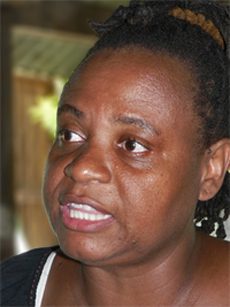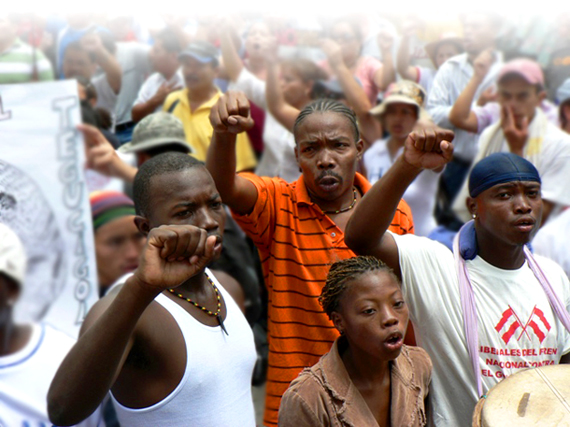|
Over the last
two decades, African palm has spread across a large part of northern Honduras.
Large landowners from the region have implemented extensive agriculture systems
for this crop, swallowing up thousands of hectares. This expansion has had
devastating effects on Garifuna communities and their ancestral lands.
|

Miriam Miranda |
The Honduran
Black Fraternal
Organization
OFRANEH
has been
accompanying the Garifuna people for many years in their daily struggle to
improve their living conditions.
OFRANEH
has spoken out on several occasion to denounce the abuses committed against the
Garifuna communities and to warn about the danger posed by the region's
industrial single-crop production model and the impact it has on climate.
While traveling
across the northern region of Honduras,
Sirel spoke with Miriam
Miranda, president of OFRANEH.
-What is
OFRANEH's stand on single-crop production and agrofuels?
-We've always
been firm in out opposition to single-crop production, especially when it is a
crop such as African palm, which is only grown to fuel the squandering of energy
of the industrialized North.
The expansion
of African palm monoculture in this country is causing serious problems.
Ultimately it is always the peoples of the South who are forced to pay the
consequences.
-Who are the
leading promoters of African palm in the area?
-Miguel
Facussé, a business operator. He started by buying up several hectares and
rapidly took over large tracts of land. He's said to have some 25,000 hectares
now, but the truth is nobody really knows how much land he owns.
He's wiped out
everything else to plant African palm, and has even reached the Garifuna
territories. He also has plans to expand palm crops in Mosquitia, which is an
indigenous reservation and one of the main lungs of the region.
-What are the
implications for Garifuna communities?
-Our highest
concern is the link between monoculture and climate change, and nobody in this
country has attempted a serious assessment to determine the costs of this
production model and if they are compensated by its benefits.
The systematic
destruction of water basins, wetlands and mangrove swamps, and the loss of
coconut groves, were ultimately responsible, for example, for the ravaging of
several communities by tropical storm Gamma in 2005.
-What happened?
-Miguel
Facussé had a barrier built to protect his palm crops from possible floods.
That caused a diversion in the river that flooded several Garifuna communities.
The damage was incalculable, and it raised the area's level of vulnerability.
The population
has also been exposed to severe conditions caused by the indiscriminate use of
agrotoxic substances, and has lost land, seen an increase in the number of
environmentally displaced people, and suffered the forced shift of production
away from basic food crops.
Several
communities have disappeared as a result of palm crop production, which has also
given rise to conflicts, violence and human rights abuses against our people.
-Has the
single-crop model also affected the culture and identity of the Garifuna people?
-The Garifuna
people believe that land shapes their cultural life. Land for us is not merely a
place to build a dwelling on, it's also a place to erect centers of worship, and
a space to hunt and plant food crops without hurting the soil.
Single-crop
plantations have destroyed our environment, and this deeply affects our cultural
identity. It's difficult to find the elements we need for our traditional
practices, practices that are part of our culture.
One of the
effects of this is that many of our young people are losing our ancestral
culture, our identity.
-What are you
doing to try to counter that situation?
-Landowners
like Miguel Facussé think that they own this country and our lives, and
we won't stand for it.
We're promoting
a debate on public policies that present only the benefits of this production
model, while concealing the costs.
Also, in
Honduras the issue of single-crop production has not been discussed in
depth, and we've teaming up with other organizations to work together and raise
serious questions about that model. The problems we have here are shared by
people in other parts of the country. So we need to strengthen these alliances,
join forces and unite our struggles.
Together we
will be able to stand up to “the beast,” combating violence and repression with
unity and solidarity.

|